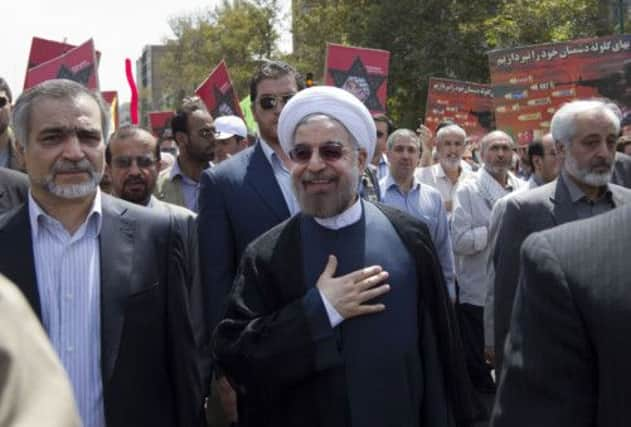New Iranian leader labels Israel ‘a wound’


Iran’s student news agency, ISNA, had quoted Mr Rouhani as saying: “The Zionist regime is a wound that has sat on the body of the Muslim world for years and needs to be removed.”
However, following an outcry, it issued a corrected version, saying: “In our region, and under occupation of Palestine and dear al-Quds (Jerusalem), there has been a wound on the body of the Islamic world.”
Mr Rouhani was speaking two days before his inauguration.
Advertisement
Hide AdAdvertisement
Hide AdIsraeli leaders seized on the retracted comments as an indication that the country would not take a more concilatory line in relations with its Middle Eastern neighbour.
The initial, disputed statement echoed the fiercely anti-Israeli language of the outgoing Iranian president, Mahmoud Ahmadinejad.
However, it was swiftly repudiated by Iranian state media, which said unidentified news agencies had distorted Mr Rouhani’s remarks.
Press TV then broadcast an excerpt from an exchange between Mr Rouhani and journalists at a rally to mark Iran’s annual al-Quds Day in support of the Palestinians.
Israeli prime minister Benjamin Netanyahu reacted to ISNA’s version of Mr Rouhani’s comments, saying they showed the reputedly moderate Iranian cleric was as hostile to Israel as Mr Ahmadinejad, whose denial of the Holocaust and description of Israel as a “cancerous tumour” prompted international condemnation.
The United States and its allies suspect Iran of seeking a nuclear weapons capability.
Tehran says its nuclear programme is purely for peaceful purposes, but Israel regards it as a threat to its existence and refuses to rule out military action against its neighbour.
With a more pragmatic president in Iran, western countries hope a better chance for diplomacy will lead to a deal to curb Tehran’s uranium enrichment programme and avoid any conflict.
Advertisement
Hide AdAdvertisement
Hide AdHowever, Mr Netanyahu said in a statement: “The true face of Rouhani has been revealed sooner than expected.
“Even if they hurry to deny his words – this is what the man thinks, and this is the Iranian regime’s plan of action.”
He also warned that Mr Rouhani’s words “must awaken the world from the illusion in which part of it is placed since the Iranian elections”, adding that Iran still aimed “to acquire nuclear weapons in order to threaten Israel, the Middle East and world peace”.
“A nation that threatens to destroy the state of Israel must not be allowed to have weapons of mass destruction,” the Israeli prime minister said.
Mr Ahmadinejad addressed Israel on al-Quds Day in his last speech as president.
“You planted wind in our region and you will reap the storm,” he said.
“I swear to God that a ferocious storm is coming and it will uproot the Zionist entity.”
Mr Rouhani was speaking at an annual pro-Palestinian rally marking al-Quds Day, the Arabic word for Jerusalem, and although his remarks appeared contrary to his outreach efforts to the West, they should also be seen in the context of internal Iranian politics, where softening the establishment’s anti-Israeli stand is not an option.
Advertisement
Hide AdAdvertisement
Hide AdIran does not recognise Israel and has, since the 1979 Islamic Revolution, observed the last Friday of the Islamic month of Ramadan as al-Quds Day.
Tehran says the occasion is to express support for Palestinians and emphasise the importance of Jerusalem for Muslims.